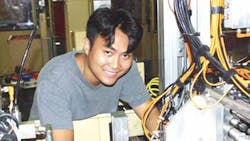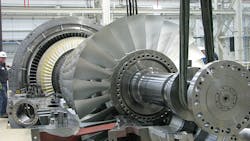Charlotte, NC -- A Smart Partnership Between Manufacturers and Educators
Advanced manufacturing feels right at home in Charlotte, N.C. The city is in the top ten of the “Smartest Cities in the U.S." In the Charlotte–Mecklenburg region there are 1,000 manufacturing establishments with 31,758 jobs. (In the state there are 10,000 manufacturers employing 435,000.)And some big hitters are willing to make sure that education is the foundation upon which a successful future will be built)
“Manufacturing is one of the most sophisticated, highly skilled and innovative areas of business in the world today because software has radically transformed the industry,” says Eric Spiegel, CEO, Siemens USA. (IW 1000/33) “We need to let students, parents and administrators know what these jobs look like and what students need to learn in order to get them,” he added while announcing an expansion of his company’s investment in the area.
The investment, announced on Sept. 24, took the form of a $32 million in-kind software grant to Central Piedmont Community College (CPCC) for its science, technology, engineering and mathematics (STEM) division.
CPCC will use the software to enhance existing courses and develop new courses related to advanced manufacturing, mechanical engineering, electrical engineering, civil engineering, electronics engineering, mechatronics, robotics and information technology.
It will also be used in an apprenticeship program with Siemens, building on the current partnership between the two organizations. In fact Siemens was one of the original partners, along with Blum, Chiron, Timken, Chiron, Daetwyler, Pfaff, Safstedt and Ameritech, in the creation of the Apprenticeship 2000 program.
The program hires high school students to participate in a four-year, hands-on technical training program. Students are recruited for this program and parents are brought into the process as well. Once accepted the students work at the factory they are matched with based on their interest and skills and they take college courses on the campus. They can work at the company during the summer and by their senior year they are working four days a week and going to college one day. Upon graduating, the student is already employed with the company, having developed the required skills through 8,000 hours of training that cater to companies’ specific needs.
Securing Specific Skills
Catering to the specific needs of the manufacturing companies in the area is the reason for the success of the program, explains Chris Paynter, Dean of STEM at CPCC. “The companies drive this program. They own it. We work with them to make sure the curriculum meets the ever changing needs of advanced manufacturing.“
The structure of the program was based on the apprenticeship program in operation across Germany. In 2012, CPCC signed a cooperative education agreement with IHK Karlsruhe, a German regional chamber of industry and commerce. That agreement made CPCC the first U.S. community college to offer IHK-certified job-training programs.
The value of that program is that “European companies, particularly those from Germany, now know Charlotte can provide a workforce trained to their exact specifications,” said CPCC President Dr. Tony Zeiss.” We think this gives Charlotte and CPCC students a distinct competitive advantage.”
Training from Germany was further expanded this year when Festo Didactic SE announced in September that it will establish a North American training center at the college's Central Campus in midtown Charlotte. Festo, based in Denkendorf, Germany, designs and implements learning laboratories, educational equipment and programs that train workers in industrial education.The Festo-CPCC Learning Center of Excellence will be part a $23.5 million advanced-manufacturing training facility that will be completed at the by 2017.
Overall, there are approximately 200 German companies with facilities in the Charlotte region and about 500 in the Carolinas. The German companies in the Charlotte region employ about 15,000 workers.
The Germany system of training has worked well for Siemens, which has its U.S. headquarters in Charlotte. The company is now taking the program into the next phase.
We are fine tuning this program for our specific needs, “explains Roger Collins, technical training specialist at Siemens Energy. His company, like all manufacturers, is struggling with making sure there isn’t a skills gap. They are addressing this issue by offering opportunities to a wide range of students with varying talents and bringing them into the company.
“Don’t pigeon hole people. Recruit from a variety of places,” Collins says. In fact Collins, who is a graduate of the apprenticeship program, feels that there is room for more women in manufacturing. He is taking a very active role in recruiting and throws out large net including veteran groups.
While Collins feels that CPCC has the equipment it needs to train workers for his plants, he would eventually like to have lab where students can learn on premise so they understand how all of the pieces of the process fits together. “Engagement is essential to ensure success and needs to be done on a daily basis.”
In addition to CPC, there are other academic institutions which feed the advance manufacturing talent pipeline. There is the University of North Carolina (UNC) at Charlotte, which is the fourth largest university in the 16-campus UNC system and York Technical College, home to a 30,000 square-foot Center for Advanced Manufacturing facility.
The pipeline is created over a period of time, explains Paynter. “It’s a mistake to expect a JIT labor force. Companies must realize that this is a long term strategy that takes upfront investment.”
Companies in Charlotte seems to understand that commitment as do others looking to locate there. Recently Giti Tire announced a $560 million investment in Chester County that will create more than 1,700 jobs in the region. YG-1 America recently announced plans to open a $13.8 million advanced manufacturing facility in Charlotte, and Goodyear is also considering a $500 million tire plant in Chester County, its first tire plant since 1978.
Other investments over the last few months include :
- Aichele Inc. will build a $2 million plant in Gastonia Technology Park that will make cutting equipment for the nonwovens and paper industries.
- Glenmark Pharmaceuticals Ltd. of India will spend $18 million to make injectable, topical and oral drugs in a facility in Airport Corporate Center in Monroe.
- Lanxess Corp. will spend $15 million to expand its lightweight-plastics plant in Gaston County to meet demand from automakers.
- Earth-Kind Inc., will spend $5.8 million to open a Mooresville plant that the company expects to grow to 380 employees within four years.
- Dalton Dynamics Corp will invest $2 million in a vacant plant to produce its industrial adhesives — used mainly in automotives.
“In North Carolina we understand the importance of cooperation between industry, education and government to maximize workforce development," said North Carolina Governor Pat McCrory.

